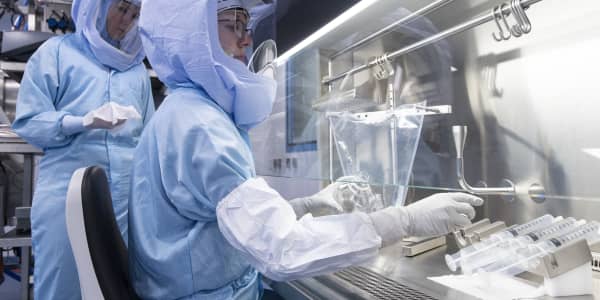Tech companies have traditionally been at the forefront of revolutionizing office space. Open floor plans have become the norm in many industries after tech companies touted the advantages they offer for collaboration and innovation. And perks like in-office gyms, child-care centers and communal cafeterias have also gained traction as companies compete to attract top talent.
But, the coronavirus may make this type of work environment a thing of the past, at least for the near future.
In an investigation recently published by South Korea's Centers for Disease Control and Prevention, out of the 216 people who worked on the floor of a call center, 94 people tested positive for the virus. And employees are concerned.
A recent survey by insurance company Prudential found that, of more than 2,000 full-time employees surveyed, 66% believe their work site will need to be restructured to create more personal space. Forty-nine percent believe that open offices and workspaces are no longer conducive to their health and wellness.
"The 6-foot rule in terms of social distancing is really all we have at the moment for protection," says Bruce Mosler, chairman of global brokerage at Cushman & Wakefield. The real estate firm says it has already helped 10,000 businesses and almost 1 million people in China transition back to the office. Based on that experience, and data from the World Health Organization, Cushman & Wakefield constructed a mock-up of what it calls "The 6 Feet Office," in Amsterdam, to demonstrate what a safe office space may look like.
"People won't have time to reconstruct their office. They are not going to have that ability. So most of what we are recommending in our playbook you're able to do at zero cost."
Amid the outbreak, most of the tech giants have been erring on the side of caution and asking employees -- who are able to -- to continue working from home.
"We're going to be the most forward-leaning company on remote work at our scale for sure," Facebook CEO Mark Zuckerberg, said during a weekly town hall with employees in May.
"And the plan that we have initially involves a couple of big steps. The first is aggressively opening up remote hiring. And we got to couple that with a more measured approach to opening permanent remote work for existing employees."
Twitter took remote work a step further. It told employees that they can work from home forever.
Several high-tech solutions may also help tech companies get back to work. Brooklyn, New York-based StrongArm Technologies created a wearable device and platform called Fuse that was initially intended to help warehouse workers avoid injuries. But the company has now reconfigured the gadget to keep workers safe amid Covid-19.
"The Fuse is able to encourage social distancing using its sensors that communicate with each other. As two users approach each other, we have haptic feedback that's delivered as they start to encroach on that 6-foot parameter that was indicated by the CDC as proper social distancing guidelines," says StrongArm Technologies CEO Sean Petterson.
Watch the video above to find out what tech giants are telling employees about the future of work and how tech offices may forever change as a result of the coronavirus.
For more on the convergence of new technology and the future of work, request a ticket to join the CNBC @ Work Spotlight virtual event on June 18, featuring VMware's Pat Gelsinger, Honeywell Connected Enterprise's Que Dallara and Genpact's "Tiger" Tyagarajan.







